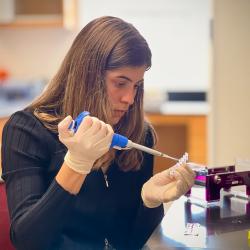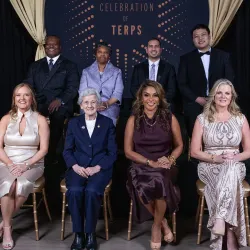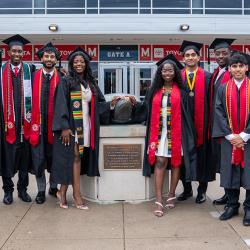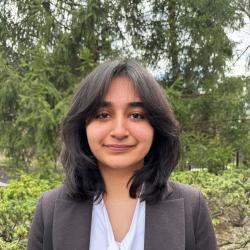Seven Science Terps Selected as Fulbright Semifinalists
The Fulbright U.S. Student Program offers research, study and teaching opportunities in over 140 countries to recent graduates and graduate students
Seven students from the University of Maryland’s College of Computer, Mathematical, and Natural Sciences have been selected as semifinalists for the Fulbright U.S. Student Program. This program offers research, study and teaching opportunities in over 140 countries to recent graduates and graduate students.
Following are introductions to the college’s semifinalists.
Fulbright English Teaching Assistantships
 Kurt Auville, an undergraduate seeking double degrees in biological sciences and Spanish, proposes to teach English in Spain. Auville currently serves as president of Science Enrichment After School (SEAS), an organization that provides science lessons to students at Adelphi Elementary School in Maryland. While in Spain, Auville would also like to volunteer at a hospital to provide support to patients and their families during hospital stays.
Kurt Auville, an undergraduate seeking double degrees in biological sciences and Spanish, proposes to teach English in Spain. Auville currently serves as president of Science Enrichment After School (SEAS), an organization that provides science lessons to students at Adelphi Elementary School in Maryland. While in Spain, Auville would also like to volunteer at a hospital to provide support to patients and their families during hospital stays.
 Beita Badiei, an undergraduate seeking double degrees in biological sciences and studio art, proposes to teach English in the Netherlands. At UMD, Badiei mentors and teaches local primary school students through Foundational Learning And Mentorship Experience (FLAME), an organization that she helped found. During her assistantship, Badiei hopes to volunteer in clinics that work with refugee populations.
Beita Badiei, an undergraduate seeking double degrees in biological sciences and studio art, proposes to teach English in the Netherlands. At UMD, Badiei mentors and teaches local primary school students through Foundational Learning And Mentorship Experience (FLAME), an organization that she helped found. During her assistantship, Badiei hopes to volunteer in clinics that work with refugee populations.
 Annie Trang, an undergraduate seeking double degrees in biological sciences and philosophy, proposes to teach English in Vietnam. Trang, who currently volunteers at the Adventist HealthCare Shady Grove Medical Center in Rockville, Maryland, would like to volunteer with nonprofit health organizations during her time in Vietnam.
Annie Trang, an undergraduate seeking double degrees in biological sciences and philosophy, proposes to teach English in Vietnam. Trang, who currently volunteers at the Adventist HealthCare Shady Grove Medical Center in Rockville, Maryland, would like to volunteer with nonprofit health organizations during her time in Vietnam.
Fulbright Study/Research Awards
 Louis-Henri Merino, a computer science undergraduate, proposes to conduct research at the École Polytechnique Fédérale de Lausanne in Switzerland. There, Merino will collaborate on a secure election system based on blockchain technology, which can improve the robustness of computer systems against hackers.
Louis-Henri Merino, a computer science undergraduate, proposes to conduct research at the École Polytechnique Fédérale de Lausanne in Switzerland. There, Merino will collaborate on a secure election system based on blockchain technology, which can improve the robustness of computer systems against hackers.
 Denis Peskov (M.S. ’18, computer science), a computer science Ph.D. student, proposes to conduct research at Ludwig-Maximilians-Universität München in Munich, Germany. There, Peskov will develop methods to improve noise filtering in algorithms that help computers understand human language. Such algorithms are used in virtual assistants, automatic speech transcription and more.
Denis Peskov (M.S. ’18, computer science), a computer science Ph.D. student, proposes to conduct research at Ludwig-Maximilians-Universität München in Munich, Germany. There, Peskov will develop methods to improve noise filtering in algorithms that help computers understand human language. Such algorithms are used in virtual assistants, automatic speech transcription and more.
 Zeshan Tariq (B.S. ’14, biological sciences), a post-baccalaureate fellow at the National Institutes of Health, proposes to conduct research at Örebro University in Örebro, Sweden. Tariq proposes to study the role of age in cardiovascular disease with the aim of finding new therapeutic targets and agents.
Zeshan Tariq (B.S. ’14, biological sciences), a post-baccalaureate fellow at the National Institutes of Health, proposes to conduct research at Örebro University in Örebro, Sweden. Tariq proposes to study the role of age in cardiovascular disease with the aim of finding new therapeutic targets and agents.
 Michelle Yuan, a computer science Ph.D. student, proposes to conduct research at Tsinghua University in Beijing, China. Yuan proposes to analyze data from Weibo, a Chinese microblogging platform. She will develop algorithms that enable computers to learn how to use social media to detect consumers’ positive and negative feelings about products such as electronics and household goods.
Michelle Yuan, a computer science Ph.D. student, proposes to conduct research at Tsinghua University in Beijing, China. Yuan proposes to analyze data from Weibo, a Chinese microblogging platform. She will develop algorithms that enable computers to learn how to use social media to detect consumers’ positive and negative feelings about products such as electronics and household goods.







